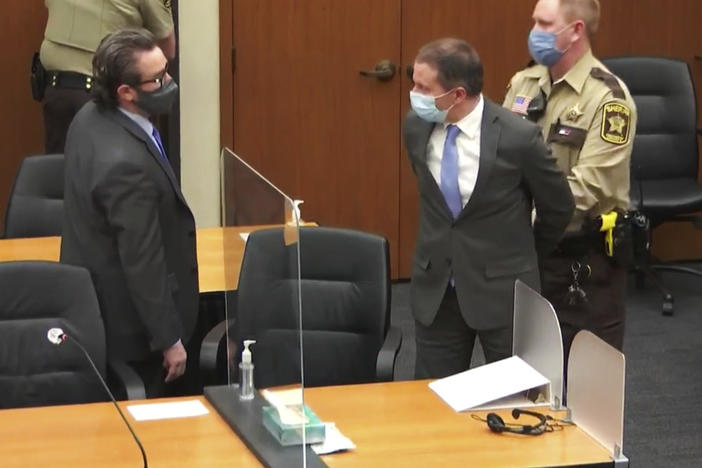Section Branding
Header Content
DOJ To Investigate Minneapolis Police Over Possible Patterns Of Excessive Force
Primary Content
Attorney General Merrick Garland announced the inquiry a day after a jury convicted former officer Derek Chauvin on murder charges in the death of George Floyd.
Transcript
RACHEL MARTIN, HOST:
Attorney General Merrick Garland says the Justice Department will investigate the Minneapolis Police Department. This announcement comes just one day after a jury convicted former police officer Derek Chauvin of murder in the death of George Floyd. This is a return to federal oversight of police forces around the country and one of the Biden administration's key pledges on racial justice. NPR national justice correspondent Carrie Johnson has been following this and joins us now. Carrie, thanks for being here.
CARRIE JOHNSON, BYLINE: Good morning, Rachel.
MARTIN: So a DOJ investigation into a local police department on what specifically, Carrie?
JOHNSON: The attorney general says this is going to be focused on problems with the entire system. They're going to be looking for patterns of excessive force, discriminatory conduct and possible mistreatment of people with behavioral and health problems. They're also going to look at training and how the Minneapolis police currently hold officers accountable. This is all about building trust with communities. Garland says good officers welcome accountability, that public safety requires public trust. And he says we undertake this task with urgency, knowing that change cannot wait.
MARTIN: So I mentioned in the intro that this move indicates a return to federal oversight of this kind. Can you explain more about what that means?
JOHNSON: Sure. During the Obama years, there were about two dozen of these pattern or practice investigations in places we all know, like Ferguson, Mo., and Baltimore and Chicago. But the Trump administration took a very different approach. Attorney General Jeff Sessions and Attorney General Bill Barr viewed local and state police mostly as their partners. They didn't want to make waves. And in fact, there was only one pattern or practice investigation during the Trump years, a small police force in Massachusetts. It's clear now, based on AG Garland's remarks, that times are changing.
MARTIN: So what are the possibilities of the Justice Department actually finding civil rights violations in this new investigation?
JOHNSON: You know, just last Friday, Attorney General Garland revoked a Trump-era memo. It will now be easier for the Justice Department to file civil lawsuits against police forces and eventually to reach consent decrees with state and local governments to try to change behavior in police departments. And importantly, it will also be possible to get independent monitors who are overseen by federal judges to go in and check to see that the police are doing what they promised to do. That form of accountability can be very important in these cases because we know that change is difficult, behavioral change, and having an extra set of eyes on these departments at the federal level and in the judicial branch is an important thing, the Justice Department says.
MARTIN: All right. NPR's justice correspondent Carrie Johnson on the news coming this morning - U.S. Attorney General Merrick Garland announcing that the Department of Justice will investigate the Minneapolis Police Department. This comes a day, of course, after the jury in Minneapolis convicted former police officer Derek Chauvin of murder on all three counts in the death of George Floyd. Carrie, thank you so much for your reporting on this. We appreciate it.
JOHNSON: My pleasure. Transcript provided by NPR, Copyright NPR.
Bottom Content



